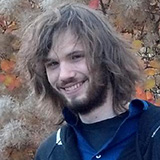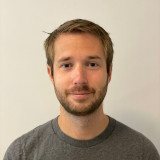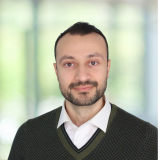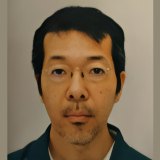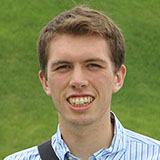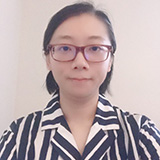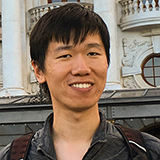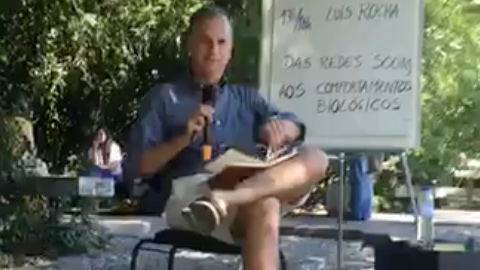Complex Adaptive Systems & Computational Intelligence
Luis Rocha's lab, the Complex Adaptive Systems and Computational Intelligence (CASCI) research group at Binghamton University and the Catolica Biomedical Research Center, works on complex systems and network science. We are particularly interested in the informational properties of natural and artificial systems which enable them to adapt, learn, and evolve. This means both understanding how information is fundamental for controlling the behavior and evolutionary capabilities of complex systems, as well as abstracting principles from nature to produce adaptive intelligent systems. This theoretical and applied research agenda focuses on tackling multiscale complexity involved in human health, and is organized in three main threads: complex networks & systems, computational and systems biology, and computational intelligence. Our publications are available online.
See our current roster and information on how to join our group. Luis Rocha is the George J. Klir Professor of Systems Science at the School of Systems Science and Industrial Engineering, and the CeBeRa Era Chair at the Catolica Medical School. Our group is seriously interconnected with other research groups and networks such as the Consortium for Social and Biomedical Complexity (CSBC), the international Center for Excellence in Mental Health Sciences, and the Center for Collective Dynamics of Complex Systems (CoCo) .
Academics and Research
We are always looking for postdocs and students at any level to collaborate with us. Professor Rocha currently works with students from various programs, chiefly the graduate program in Systems Science at Binghamton University (SUNY), Graduate programs at the Católica Medical School, other positions at the Católica Biomedical research Center, and the NSF-NRT Interdisciplinary Program in Complex Networks & Systems he created.
Any open positions are listed in our news page. Note that we will soon (early 2025) be accepting applications for one or more full-time non-tenure track postdoctoral fellows to conduct interdisciplinary research in Complex Networks and Systems applied to various social, ecological, biological, medicine and health problems in our lab at the Systems Science and Industrial Engineering Department at Binghamton University (State University of New York) or the Catolica Biomedical Research Center.
Current lab members see graduate forms needed during Systems Science program. There is also a dissertation proposal set of guidelines, and dissertation and thesis examples.
Mailing
You are welcome to join our Google Group and mailing list CASCI@binghamton.edu by requesting to join.
CASCI Meetings and Office Hours
The CASCI lab meets Friday @ 09:30am in Engineering Building, Complex Adaptive Systems and Computational Intelligence Lab (EB, C3, 1st Floor), and on Zoom. Several lab members hold weekly office hours, check our calendar below .
Latest Defenses
Congratulations to CASCI member Felipe Xavier Costa for successfully defending his dissertation entitled "Leveraging Redundancy As A Link Between Spreading Dynamics On And Of Networks in August 2024 in the Physics Department of the University at Albany (SUNY). Felipe was supervised by Luis Rocha. Dr. Costa’s research investigates how redundancy in heterogeneous, multivariate dynamical systems can connect how dynamics affect network topology and which pathways are necessary for spreading phenomena on networks and complex nonlinear dynamics of automata networks (with node dynamics). Felipe is now a postdoctoral fellow at the Instituto Gulbenkian de Ciencia
Congratulations to CASCI member Miguel Bernardo Pereira for successfully defending his M.S. Thesis entitled "Distance Backbones of Weighted Graphs" in December 2023. Bernardo was co-supervised by Luis Rocha and Pedro Martins Rodrigues. Mr. Pereira's research deals with the topic of sparsification of weighted graphs using distance backbones of a weighted graph. He examined how these backbones preserve characteristics of epidemiological simulations carried out onsocial networks using Susceptible-Infected and Susceptible-Infected-Recovered models. Bernardo is currently a research assistant at the Instituto Gulbenkian de Ciencia .
Postdocs and Research Fellows
PhD Students
Undergraduate Students
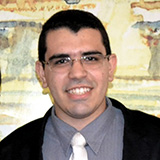
Dr. Felipe Xavier Costa
Ph.D Dissertation "Leveraging Redundancy As A Link Between Spreading Dynamics On And Of Networks", 2024, in the Physics Department of the University at Albany (SUNY). Currently Postdoctoral Fellow, Instituto Gulbenkian de Ciencia, Portugal.
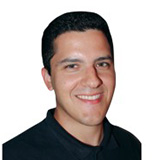
Miguel Bernardo Pereira
M.S. Thesis "Distance Backbones of Weighted Graphs", 2023, in the Applied Mathematics and Computation Program at the Instituto Superior Tecnico, Lisbon, Portugal. Currently Graduate Research Assistant, Instituto Gulbenkian de Ciencia, Portugal.
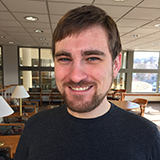
Dr. Ian B. Wood
PhD dissertation in the Complex Systems track of the Informatics PhD Program : "Time-series analysis of sentiment in social media can predict individual and collective behavior of public health significance, 2023, Indiana University. Currently Senior Software Engineer at LinkedIn
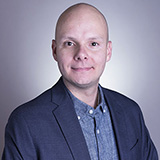
Dr. Rion Brattig Correia
Previous postdoctoral fellow and PhD student with dissertation in the NSF-NRT Interdisciplinary training in Complex networks and Systems: Prediction of Drug Interaction and Adverse Reactions, with data from Electronic Health Records, Clinical Reporting, Scientific Literature, and Social Media, using Complexity Science Methods. 2019, Indiana University. Currently Principal Data Scientist at NielsenIQ.
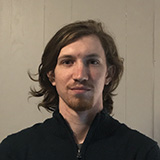
Austin Marcus
M.S. Thesis "Genesis of organization from random mixture: emergence of complex spatial patterns in a non-driven collective motion model", 2023, in Systems Science, Binghamton University. Currently a PhD student in the Mathematical, Computational and Systems Biology (MCSB) program at the University of California, Irvine.
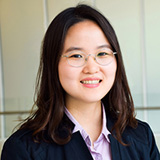
Dr. Aehong Min
PhD dissertation in the health Informatics track of the Informatics PhD Program : "Extending and facilitating informal care networks, 2023, Indiana University. Currently Postdoctoral Scholar at the University of California, Irvine
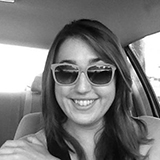
Dr. Kelly McClinton
PhD dissertation in the NSF-NRT Interdisciplinary training in Complex networks and Systems and individualized dual-major in Virtual Heritage: Computationally Modeling Roman Domestic Art and Architecture. 2021, Indiana University. Currently DPhil Student at Oxford University, Assistant Director of the Virtual World Heritage Lab at Indiana University, and research affiliate at the Complex Adaptive Systems and Computational Intelligence Lab at Binghamton University.

Dr. Andreia Sofia Teixeira
Previous Postdoctoral Fellow: Currently Assistant Professor, Department of Informatics at the Faculty of Sciences, University of Lisbon.
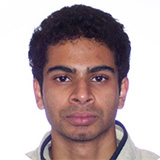
Sikander Khare
MS Thesis in Informatics/Complex Networks and Systems: Canalization in Stochastic Boolean Networks. 2020, Indiana University. Currently Ph.D. student at the University of Florida.
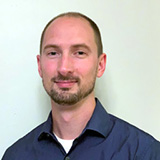
Dr. Steven Williams
Dual-PhD dissertation in the Complex Systems track of the Informatics PhD Program as well as the Cognitive Science program: “Neural Correlates of Adaptive Behavior: Structure, Dynamics, and Information Processing. 2019, Indiana University. Currently a Software Developer at the National Institute for Occupational Safety and Health (NIOSH), Centers for Disease Control and Prevention.
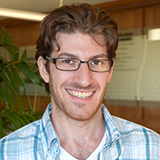
Dr. Alexander Gates
Dual-PhD dissertation in the Complex Systems track of the Informatics PhD Program as well as the Cognitive Science program: The anatomical and effective structure of complex systems. 2017, Indiana University. Currently Assistant Professor, School of Data Science, University of Virginia.
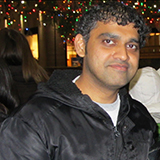
Dr. Santosh Manicka
PhD dissertation in the Complex Systems track of the Informatics PhD Program: The Role of Canalization in the Spreading of Perturbations in Boolean Networks. 2017, Indiana University. Currently Postdoctoral Research Associate at Michael Levin’s lab, Biology Department, Tufts University.
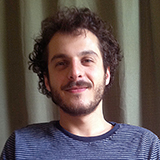
Dr. Artemy Kolchinsky
PhD Dissertation in the Complex Systems track of Informatics: Measuring Scales: Integration and Modularity in Complex Systems. 2015, Indiana University. Currently a researcher at the Universal Biology Institute, a theoretical biology group at the University of Tokyo.
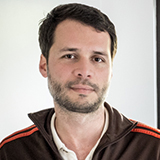
Dr. Manuel Marques-Pita
Previous Postdoctoral fellow. Currently: Assistant Professor at the Universidade Lusófona de Humanidades e Tecnologias, Lisbon, Portugal. See also his famous sejkko alter-ego on Instagram
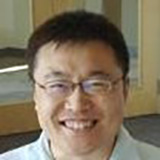
Dr. Zhiping Wang
PhD Dissertation in Computer Science: Biomedical Literature Mining for Pharmacokinetics Numerical Parameter Collection . 2012, Indiana University. Currently Director of Bioinformatics Core at University of Pennsylvania
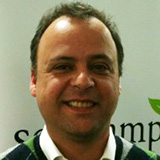
Dr. Tiago Simas
PhD Dissertation in Cognitive Science: Stochastic Models And Transitivity In Complex Networks. 2012, Indiana University. Currently Associate Professor and Head of the Informatics and Information Systems Department at the Universidade Lusófona de Humanidades e Tecnologias, Portugal
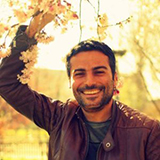
Dr. Alaa Abi-Haidar
PhD Dissertation: An adaptive document classifier inspired by T-Cell cross-regulation in the immune system. 2011, Indiana University. Currently artist/scientist-in-residency at the Instituto Gulbenkian de Ciencia
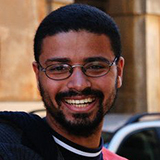
Dr. Marcio Mourao
PhD Dissertation: Reverse engineering the mechanisms and dynamical behavior of complex biochemical pathways. 2011, Indiana University. Currently: Data Science Consultant for the Consulting for Statistics, Computing and Analytics Research Center (CSCAR) at the University of Michigan.
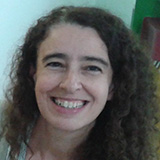
Professor Ana Maguitman
Previous Postdoctoral fellow. Currently: Professor at the Computer Science and Engineering Department of the Universidad Nacional del Sur, Argentina
Dr. Humberto Santos
PhD Dissertation: Analysis and simulation of the innovation process from an evolutionary perspective. 2008, Universidade da Beira Interior, Portugal. Deceased.
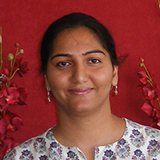
Jasleen Kaur
MSc. Bioinformatics, Indiana University, 2007

Professor Chien-Feng Huang
Previous Postdoctoral fellow. Currently: Professor in the Department of Computer Science and Information Engineering, National University of Kaohsiung, Taiwan.
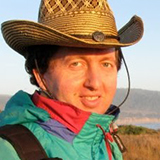
Dr. Andreas Rechtsteiner
PhD Dissertation: Multivariate Analysis of Gene Expression Data and Functional Information: Automated Methods for Functional Genomics. 2005, Portland State University. Currently: Associate Scientist at UC Santa Cruz.
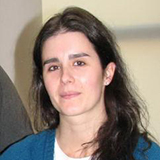
Professor Anália Lourenço
Previous Postdoctoral Visitor. Currently Associate Professor at Universidade de Vigo: Ourense, Ourense, Spain.
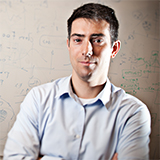
Professor Johan Bollen
PhD Dissertation: A cognitive model of adaptive web design and navigation. Vrije Universiteit Brussel, Brussels, Belgium, 2001. Currently: Professor, Indiana University.
If you are interested in working with us in Complex Systems, Complex Networks, and Computational Intelligence, there are several ways to study and collaborate with us. Professor Luis Rocha supervises students and works with postdoctoral and senior researchers.
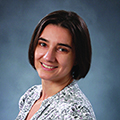
Reka Albert

Liana Apostolova
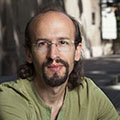
Alain Barrat
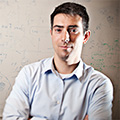
Johan Bollen

Katy Börner
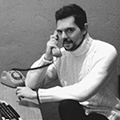
Paulo Navarro Costa

Manlio DeDomenico
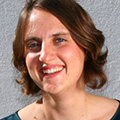
Joana Gonçalves-Sá

Lang Li
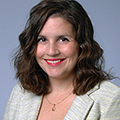
Wendy Miller
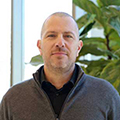
Filippo Radicchi
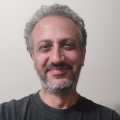
Giancarlo Ruffo
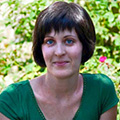
Selma Sabanovic
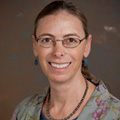
Hagit Shatkay
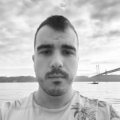
David Soriano-Paños
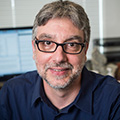
Olaf Sporns

Alfonso Valencia
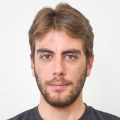
Salvatore Vilella
Selected people we have collaborated with:
Alaa Abihaidar, Fernando Almeida e Costa, Michael Altherr, R. Baker Kearfott, Mark Bedau, Johan Bollen, Thomas Brettin, Edward Browne, Jean Challacombe, Ernesto Costa, Rui M. Costa Antonio Coutinho, Mariella DiGiacomo, Dario Floreano, Florentino Fdez-Riverola, Rob Goldstone, Raphael Gottardo, Inman Harvey, Charles Henry, Wim Hordijk, Chien-Feng Huang, Norman Johnson, Cliff Joslyn, Marianna Kantor, Jasleen Kaur, Vladik Kreinovich, Lang Li, Anália Lourenço, Richard Luce, Jeremy Luinstra, Ana Maguitman, Manuel Marques-Pita, Pedro Medina-Martins, Melanie Mitchell, Sheetal Narayanan, Predrag Radivojac, Predrag Radivojac, Steen Rasmussen, Andreas Rechtsteiner, Isabel Rocha, Miguel Rocha, Hagit Shatkay, Thomas Shenk, Tiago Simas, Steven Smith, Charlie Strauss, Herbert Van de Sompel, Karin Verspoor, Alessandro Vespignani, Michael Wall, Zhiping (Paul) Wang, Larry Yeager.
Present and Past affiliated Research Groups:
Indiana University Network Institute and CNeTS: Center for Complex Networks and Systems @ The School of Informatics and Computing, Complex Systems & Networks @ Indiana University, NaN- the Networks and Agent Networks, Artificial Life @ Indiana University, Computational Biology @ Instituto Gulbenkian de Ciencia, Complex Systems Modeling Team @ Los Alamos National Laboratory
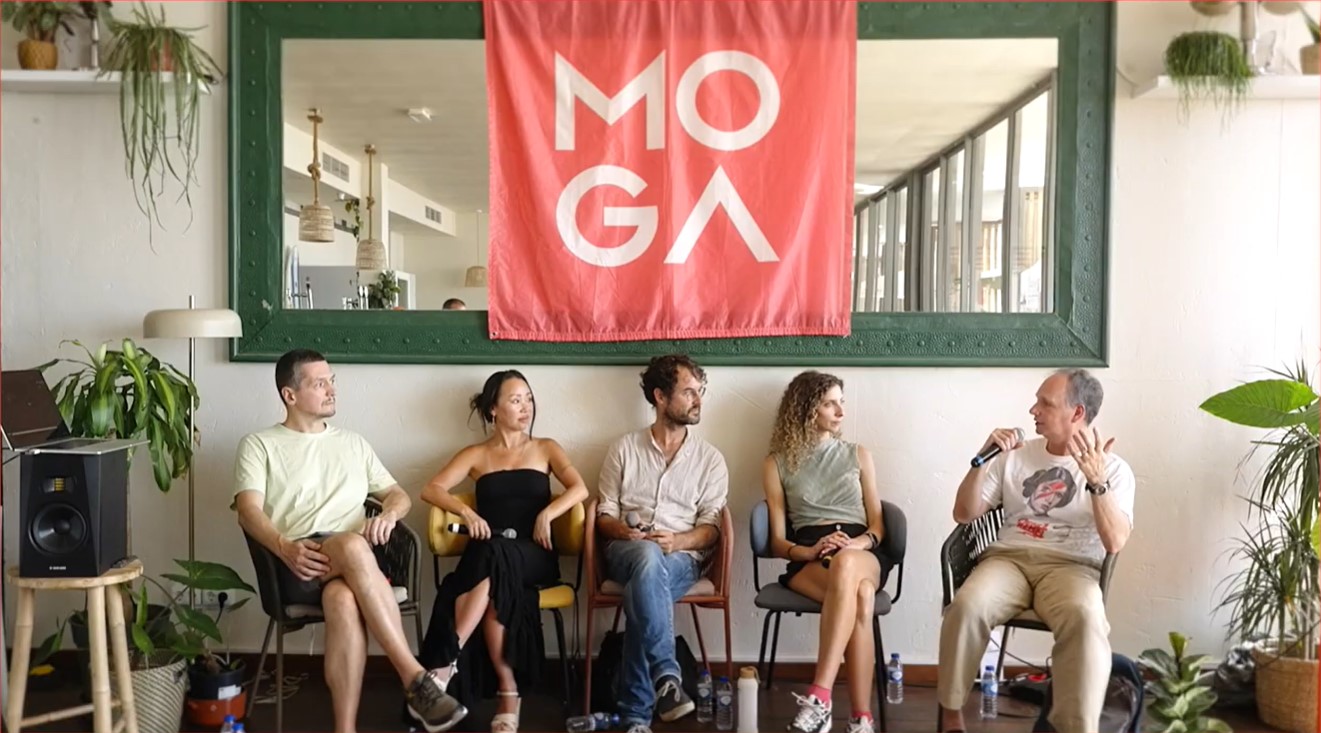
From cybernetics to the global brain: AI, Decision, Control, and Creativity
MOGA Caparica Festival 2025: AI: How it's Shaping the World of Creativity - MOGA Festival
May 28, 2025
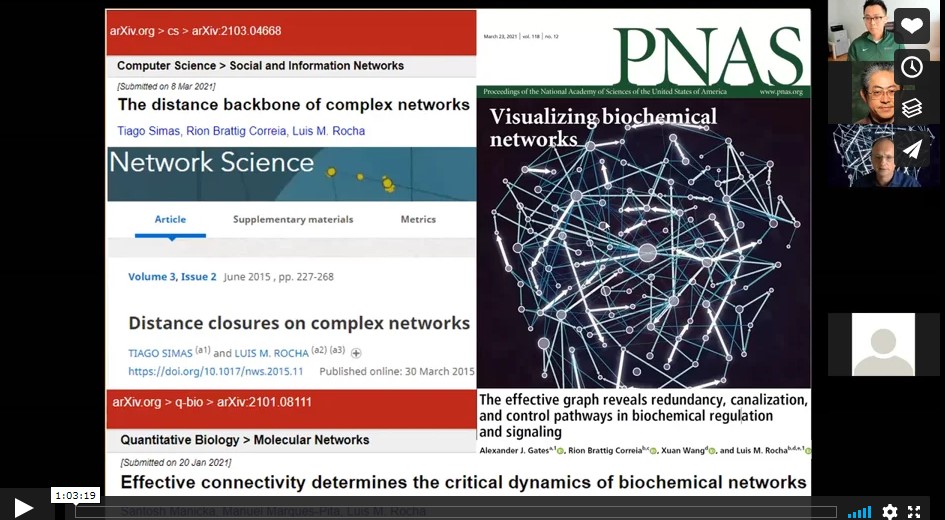
Redundancy in Structure and Dynamics of Complex Systems
NERCCS 2021:
Fourth Northeast Regional Conference on Complex Systems
April 1, 2021
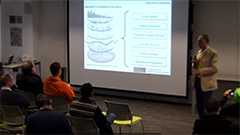
Towards Understanding the Multi-Level Complexity of Human Health: From Drug Interaction to Human Reproduction Cycles
Centro de Ciencias de la Complejidad C3
January 31, 2018
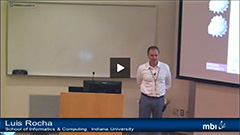
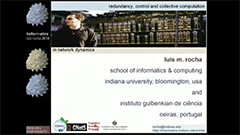
Redundancy, control and collective computation in network dynamics
Indiana University Network Science Institute Talk Series
October 13, 2014
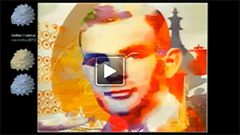
Turing’s Tape and the Cybernetics of Biocomplexity
The Alan Turing Centenary Symposium
October 13, 2014
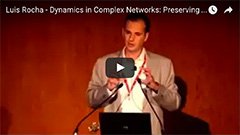
Dynamics in Complex Networks: Preserving robustness in a hyper-connected World
Invited Lecture at Everything Is Connected Conference @ GreenFest, Estoril, Portugal.
September 18, 2009

